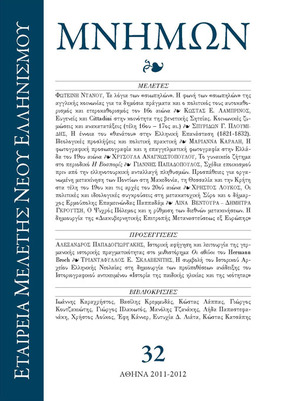Αρχαίος ελληνισμός και φιλελληνισμός στη βρετανική ιστοριογραφία του 19ου αι. : οι πολιτικές και ηθικές διαστάσεις του «Εθνικού» και οι ευρύτερες πολιτισμικές σημασιοδοτήσεις της ελληνικής ιστορίας
Part of : Μνήμων ; Vol.22, 2000, pages 69-104
Issue:
Pages:
69-104
Parallel Title:
«Hellenism» and «Philhellenism» in Nineteenth-Century British Historiography : Political and Moral Dimensions of the National and the Wider Cultural Connotations of Greek Histor
Section Title:
Articles
Author:
Abstract:
The article examines the interplay between the «national» and the «European» connotations of «Greekness» within two kinds of nineteenthcentury British historical texts: Histories of Ancient Greece on the one hand, and Histories of the Greek nation «from ancient to modern times» on the other. The article argues that both kinds of historical texts utilize the ambivalence involved in nineteenth-century undesrtandings of «Greekness» in order to comment on the relationship between the political and moral dimensions of «nationality» and the wider cultural, economic and social values associated with nineteenth century concepts of «Europeanness». However, this commentary is constructed differently in each historiographical context, and these differences point towards the relative autonomy of the wider «hellenist» and «philhellenic» discourses from which these two kinds of texts derive. Reaching its peak with George Grote's History of Greece (1846- 1856), nineteenth century «hellenist» historiography re-writes the history of ancient Greece as a national «epic», «liberal» fifth century Athens as its collective «hero», and the Macedonian conquest as the moment of closure of «authentic» Greek history. Furthermore, by situating the patriotic ethos of the Athenian citizen at the centre of the wider «Panhellenic» aims of the Athenian polis, nineteenth-century British historians constructed a parabole, through which they projected traditional notions of British «patriotism» at the very centre of the nineteenth century notions of Europeanness. Histories of Greece from «ancient to modern times», on the other hand, take their rise from a distinctly «philhellenic» intention, that is from an intention to «understand» and to «defend» the modern Greeks. The interplay between the «national» and the «European» connotations of Greek identity unfolds here as a commentary on the relationship between the «classical», the «Roman/Byzantine», and the «Eastern Christian» facets of «Greekness». Ultimately, the article argues, in its effort to reincorporate the modern Greeks to Europe, philhellenic historiography was led to reintroduce the history of the «post-Byzantine/ Christian Ottoman» peoples to the common fold of European History, challenging, thus, prevalent notions of «Europeanness» nurturing from classicized images of Ancient Greece.
Subject:
Subject (LC):




